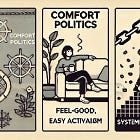The Failure of Conscious Capitalism as Casus Belli
we set up a trap for ourselves and walked right into it
Many of us want to believe that by working for companies that align with our values, we can help reform capitalism from within. The rise of conscious capitalism and ESG (Environmental, Social, and Governance) investing offers the seductive promise that businesses can "do well by doing good," integrating social responsibility and environmental stewardship into the profit motive. This narrative suggests that capitalism can evolve into a more ethical system, and that by choosing the right employers or investments, we can contribute to a more just and sustainable world.
But this belief, while comforting, is ultimately a trap laid by the ruling class. Conscious capitalism offers the illusion of reform while leaving the underlying structures of exploitation and inequality untouched. It presents ethical improvements as progress, but in reality, it serves as a containment strategy, neutralizing deeper critiques of capitalism and preserving the status quo.
When, inevitably, conscious capitalism fails to meet traditional financial expectations, its collapse becomes a casus belli for the ruling class—a justification to abandon even the pretense of ethical business practices and double down on exploitation.
The Trap of Conscious Capitalism
Conscious capitalism entices us with the idea that businesses can operate with a higher moral purpose while still generating profits. It suggests that companies can prioritize social and environmental responsibility without sacrificing financial performance. The ruling class has embraced this narrative because it allows them to appear progressive and responsive to public concerns while continuing to exploit labor, resources, and ecosystems.
In reality, conscious capitalism is nothing more than a repackaging of traditional capitalist logic. History has shown us that capitalism has a unique ability to absorb reform movements without changing its core dynamics. From the Progressive Era to corporate social responsibility (CSR) initiatives, capitalism has co-opted ethical reforms, diluting them to ensure that the system remains fundamentally the same. Conscious capitalism is no different—offering superficial changes that preserve the underlying structures of wealth accumulation and inequality.
The Profit-Driven Trap
The inherent flaw of conscious capitalism lies in its reliance on the same profit-driven metrics that govern traditional capitalism. While ethical investments are tolerated as long as they generate competitive returns, they remain vulnerable to dismissal the moment they fail to meet financial expectations. Conscious capitalism, in this way, remains unstable—its success dependent on the short-term whims of capital rather than on any genuine commitment to social or environmental well-being.
When conscious capitalism inevitably falters under the pressures of profitability, the ruling class will seize the opportunity to declare ethics incompatible with business. This failure will become a justification for abandoning even the minimal ethical commitments that conscious capitalism claims to uphold. The ruling class will argue that profit must come first, always, and that attempts to integrate ethics into capitalism are unrealistic and unsustainable. This narrative will serve as a powerful tool to reinforce the primacy of profit over all other considerations, giving the ruling class cover to return to more exploitative practices.
Conscious Capitalism as Containment
Conscious capitalism serves not only as a trap but also as a containment strategy—a way to neutralize calls for deeper, systemic change. By offering small improvements, such as better labor practices or sustainability efforts, conscious capitalism creates the illusion that progress is being made. Workers and consumers are given just enough reason to believe that their actions are contributing to positive change, without ever questioning the deeper structures of capitalism.
This containment is highly effective because it offers a compromise: we get to feel morally satisfied by working for or supporting "ethical" companies, while the system’s core dynamics remain intact. By focusing on incremental reforms, conscious capitalism diverts energy away from more radical critiques that challenge capitalism itself. It reassures us that we can have both profit and purpose without fundamentally rethinking the system. But in doing so, it prevents us from addressing the deeper forces that drive inequality, exploitation, and environmental degradation.
The Role of the Ruling Class
The ruling class benefits immensely from the narrative of conscious capitalism. By framing ethical business practices as a means of reforming capitalism, they diffuse more radical critiques that would demand deeper, structural change. The ruling class has no interest in fundamentally altering the system that maintains their wealth and power, but by co-opting the language of ethics and responsibility, they can appear as though they are leading the charge for positive change.
This co-option extends beyond corporate boardrooms and into public policy. ESG frameworks, touted as solutions to global challenges like climate change and inequality, are championed by governments and international organizations. But they operate within the same profit-driven logic that governs the rest of the economy. As long as ethical practices are judged by their ability to generate profit, they will remain vulnerable to the same forces that have always driven capitalism—short-term gain, market competition, and the concentration of power and wealth.
Conscious Capitalism’s Failure as a Preemptive Strike Against Systemic Change
The failure of conscious capitalism does more than just reinforce the status quo—it serves as a preemptive strike against more radical alternatives. If even the most ethical version of capitalism cannot succeed, the ruling class can argue that deeper structural changes are bound to fail as well. By positioning the collapse of conscious capitalism as evidence that ethics and profitability are fundamentally incompatible, they discredit calls for systemic reform.
This narrative becomes a potent weapon against movements that advocate for economic democracy, degrowth, or commons-based production. If conscious capitalism fails, the ruling class will use it as proof that no alternative system could possibly work. They will argue that capitalism, despite its flaws, is the only viable economic system, effectively shutting down discussions about what a truly just and sustainable economy might look like.
The Need for New Metrics
The core problem with conscious capitalism is that it continues to measure success by the same standards as traditional capitalism—profitability. As long as ethical practices are evaluated solely by their ability to generate profit, they will remain vulnerable to dismissal. The ruling class will continue to argue that profitability must come first, and anything that threatens profit margins will be cast aside as impractical.
To escape this trap, we must redefine what success looks like. We need new metrics that prioritize long-term social and environmental well-being over short-term profitability. This means shifting the focus away from shareholder value and toward broader measures of human flourishing—metrics that account for the health of ecosystems, the well-being of workers, and the stability of communities. Only by changing how we define success can we create an economy that is truly ethical and just.
But the ruling class resists these new metrics because they threaten the very foundations of their power. If success were measured by collective well-being rather than profit, the ruling class would no longer be able to justify their disproportionate control over wealth and resources. The current system persists because it benefits those who hold power within it, and any challenge to that system is seen as a threat to their dominance.
Building a New World
The failure of conscious capitalism should not be seen as a defeat for ethical business practices but as an opportunity to confront the deeper forces at play. It should push us to move beyond incremental reforms and toward a more radical reimagining of how we organize our economy and society.
We must break free from the idea that capitalism can be reformed into something just and humane. Instead, we need to build new systems that prioritize collective well-being, sustainability, and justice. This means developing economic models that emphasize cooperation, shared ownership, and mutual aid—systems that place people and the planet at the center, not profit.
To build this new world, we must reclaim control over our labor and our lives. We must reject the premise that the current system is the only way to organize society and start imagining and building alternatives that challenge its logic. This means moving beyond profit as the sole metric of success and embracing a more holistic vision of well-being—one that centers human dignity, environmental sustainability, and collective flourishing.


